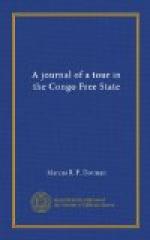Next day we reach the Catholic Mission of Sainte Famille also on French territory. The Fathers have laid out a large plantation and farm; horses, cattle, sheep, goats and poultry all doing well. Indeed modern American ploughs and carts give the farm quite a home-like appearance. Maize, oranges, bananas, pineapples and many vegetables are here in abundance. Sleeping Sickness is not known, which immunity is attributed by the priests to the fact that the natives have plenty of fresh meat and eat little kwanga. Apparently the disease is due to a bacillus. It is however, at least possible that the new diet of the civilised native may be a predisposing factor. The savage is naturally carnivorous and before the advent of the white man, had little to eat but animal flesh. Now his chief article of diet in the western parts of the Congo is kwanga, which consists chiefly of starch, and he has only a little meat and fish. Along the Congo where the native is civilised, there is much sleeping sickness, but along the Ubangi where he is more savage, there is practically none. The Fathers give us some spirits distilled from the papye and pineapple which are very good and beer made from maize which is not. They then show us round the grounds and before we leave load us with eggs and fresh vegetables which are very acceptable. At sunset we tie up to the bank and make a camp. It is wonderful how quickly the grass is cut down, the tents erected, fires lighted and dinner cooked, for when the native knows he has to perform a certain definite task, he works hard, so that he can eat his dinner and get to sleep as soon as possible. Chikaia apparently has a fine sense of satire or humour. A table was broken and when I asked how it was done, Chikaia instead of answering “it has been done a long time” as an European servant would, went one better and said “it has always been like that.” “I suppose it was made so,” I replied. “Yes, Sir” was the answer and there was no more to be said.
The banks of the river are here lined with villages and each time we stop crowds run to see the steamer, while the Chief comes on board, shakes hands solemnly and presents eggs, chicken or a goat. In return we hand back a good value in cloth, beads or salt. Mitakos are not seen here at all, for beads are used instead. The natives always seemed grateful and satisfied with their presents, which was rarely the case on the Congo where the people generally grumble even when they receive many times the value of the article they sell. We camp at the village of Dru, where we find it very difficult to pitch tents owing to the rocky nature of the soil.




